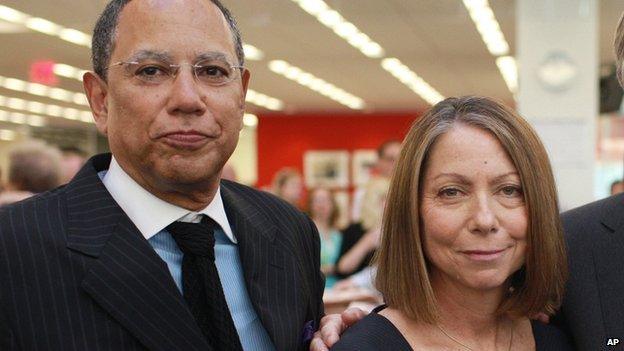Jill Abramson out as New York Times executive editor
- Published
- comments

The New York Times announces that Jill Abramson (right) will be replaced as executive editor by Dean Baquet (left)
Jill Abramson, the first female executive editor of the New York Times, is departing the paper.
The Times reported the news, external on its website Wednesday afternoon, saying Ms Abramson was "unexpectedly leaving" and that "the reasons for the switch were not immediately clear". announced the news
Ms Abramson, who assumed the top spot in 2011, was the first female executive editor at what is generally considered the nation's most prestigious newspaper.
"I've loved my run at the Times," Ms Abramson said in a statement to the Times. "I got to work with the best journalists in the world doing so much stand-up journalism."
According to Politico, external media reporter Dylan Byers, Times publisher Arthur Sulzberger Jr told the staff Ms Abramson's move was due to "an issue with management of the newsroom". She was not present at the time of the announcement.
"I choose to appoint a new leader for our newsroom because I believe that new leadership will improve some aspects of the management of the newsroom," Politico quotes Mr Sulzberger as saying. "This is not about any disagreement between the newsroom and the business side."
Mr Sulzberger announced that current managing editor Dean Baquet will take over the executive editor job, effective immediately. He said Baquet "is an exceptional reporter and editor with impeccable news judgement who enjoys the confidence and support of his colleagues around the world and across the organisation".
Mr Baquet won a Pulitzer Prize for investigative journalism in 1988 and becomes the paper's first black executive editor.
The announcement caught much of the media world off-guard. As Vox's Matthew Yglesias writes, external, the Times was flourishing despite a generally dismal business environment for print publications in the US.
"You often see companies change management amidst business crises," he says. "But one thing that is clear is that amidst a generalised crisis for the American newspaper industry the Times is doing quite well as a business."
He continues:
In the first quarter of the year, the Times scored a $22m (£13m) operating profit on $390 million in revenue. That revenue figure represented a 2.6% increase from the year-ago quarter, including a 3.4% increase in ad revenue.
Ms Abramson's tenure was not without its controversy. An August 2013 New York magazine article, external said that Abramson "chafed" at the decisions made by Times president and former BBC director general Mark Thompson who redirected "company resources to projects of ambiguous design".
In April 2013 Politico's Byers wrote a lengthy article, external detailing what he characterised as the executive editor's often tumultuous relationship with her staff.
"In recent months, Abramson has become a source of widespread frustration and anxiety within the Times newsroom," he wrote. "More than a dozen current and former members of the editorial staff, all of whom spoke to Politico on the condition of anonymity, described her as stubborn and condescending, saying they found her difficult to work with."
Byers reported that it was Mr Baquet who provided "reassurance" to the newspaper's frustrated reporters and editors.
The article stirred considerable anger. Ms Abramson called it, external "a nutty piece" and a "shoddy, sexist" attack on her.
Slate's Hanna Rosin wrote, external at the time:
Abramson, like every human being on the planet, has many sides to her personality. Yes, some reporters find her stubborn and condescending and difficult to work with. Yes, she does not have the natural charisma of Baquet, but few people do ("the best newsroom politician I've ever met," one reporter told me). But she can also be honest, exacting, funny, loyal, and very generous.
The abrupt departure of the newsroom head of the New York Times is a big deal for those who follow the media closely. When it involves arguably the most important female journalist in the US, in a climate of "leaning in, external" and discussion of the challenges faced by female executives, the news takes on national importance.
The significance of Mr Baquet's elevation to the top spot will be clouded by what is sure to be a growing controversy surrounding Ms Abramson's departure. There is too much riding on Ms Abramson and her legacy for the story to end here.
- Published15 May 2014
